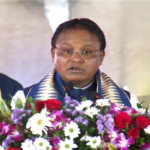Hijabs during exams: Karnataka girl students move SC seeking permission; CJI says will form bench

Karnataka,Feb 22 : A group of girl students from Karnataka on Wednesday approached the Supreme Court for an urgent hearing on their plea, seeking permission to sit for exams while wearing hijab.
Pre-university exams in Karnataka are expected to begin on March 9. The Chief Justice of India (CJI) DY Chandrachud assured the student petitioners that he would look into the matter and form a bench.
Advocate Shadan Farast mentioned the matter before the CJI seeking urgent listing, saying that the exams are scheduled to commence on March 9 and the girls will lose a year if they are not allowed to sit for the exams.
When the CJI asked “who was stopping them from taking exams”, the advocate said, “Girls are not allowed to take exams with their headscarves on and the girls are not ready to give exams without it. We want only limited relief for them.”
On January 23, the CJI agreed to consider the request for urgent listing, after senior advocate Meenakshi Arora mentioned the urgency of examinations, which are held in government colleges.
After the Karnataka government banned the wearing of hijab in Government Pre-University Colleges, several Muslim students had to move to private colleges. However, the exams are conducted in government colleges, where there is a restriction on hijabs. Against this backdrop, the petitioners have sought interim relief.
Karnataka hijab row: ‘Will right to dress also mean right to undress?’ asks Supreme Court
The top court in October 2022 delivered a split verdict on the ban on wearing hijab in educational institutions in Karnataka – one judge affirmed that the state government is authorised to enforce uniforms in schools, while the other called the hijab a matter of choice that cannot be stifled by the state.
The petitioners had appealed in the Supreme Court against the Karnataka high court judgment, which held in March last year that the wearing of hijab by Muslim women is not mandatory in Islam and that the Karnataka government was well within power to enforce the uniform mandate.
-The India Today







